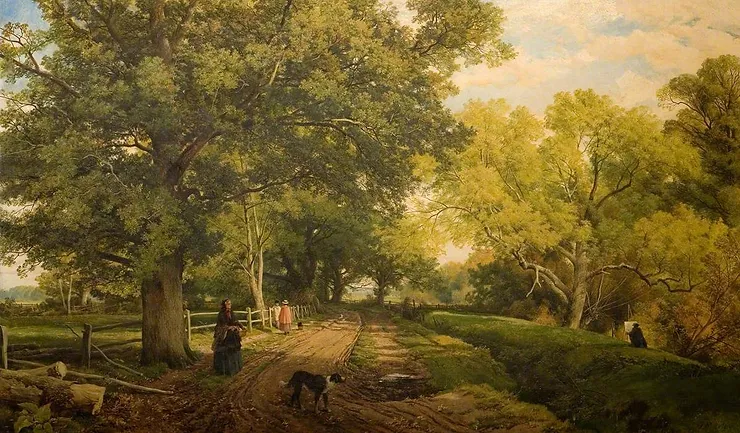By: Ethan Pi
It was a chilly afternoon in 17th-century London. I walked up the old, rock-bedded road that led up to the Red Brick Building, more formally known as the Minister Church in all of England. I had been wandering half an hour earlier wondering how in the world I would transport my cattle and other necessities down English Avenue, the only narrow passage at the time that could lead me to my destination.
I made a cursory inspection of my luggage and a first glance at the sky (I hadn’t seen the sky at all that same day), only to find the weather most peculiar, before finally embarking on my long journey ahead. The clouds had now turned a magical swirl of angry red and a bluish lavender as the Sun peeked in and out of the cracks in between them. Something in the back of my mind told me that it was going to rain. Yes, there were dark clouds, but not a great many, and I had to get to the Red Brick Building just in time (sometime before the rain started pouring down).
The narrow dirt road that once led up to the pastoral view of the countryside now formed a two-lane avenue: English Avenue. I watched as the view of cattle, shepherds, goats, and farmers had now turned to clergymen, apothecaries, and one-room schoolhouses. The Black Plague had just hit about a year ago, so it was quite a surprise to see an unusual number of people roaming about.
The scent of the church could be smelt from a distance. The whole area reeked of sweat and rotten apples, but no one dared to complain. I peered out of one of the stain glass windows painted with the stories of Jesus and saw a graveyard nearby. This was where my grandfather had been buried roughly a month ago and was the whole reason I came to the church: to commemorate his lost life and his contribution to the community. People poured in from the front door and started gathering at open seats. An unfortunate few, however, were forced to stand or even lean against the back wall.
A little man in a white wig entered from the left side of the stage, happy to greet and welcome us to the ceremony. His name was Joseph Roberts and he was pretty much the minister of the church. He began with his casual “Greetings everyone! Today we shall host, in the Elizabeth Minister Church in England, our monthly commemorative service!”
After the minister made a few anecdotes about Christopher Columbus landing in the Western colonies and calling the place “India,” he went on to say in a firm and tenacious, albeit friendly, voice, “Let us all hold and clench dearly to our hearts the lost lives of those who have been deceased in our honor. Let’s salute those who have passed away in front of our own eyes as we barely made it to say a final ’Goodbye.’ Does anyone have a special loved one they would like to announce or observe?”
I closed my eyes for a split second, reimagining the life I had with my grandfather before he took his last breath and closed his eyes to see my existence for the very last time. I remembered his last words he wasted on me, which were, “You will always be my grandson,” before finally drifting off into the heavens above. It was almost as if he was repeating the same six words again in the silence that followed.
A woman sitting in the front row snapped me back into reality. “Noble Christianson, my father-in-law who passed away recently due to the plague.” An old man sitting a few seats away from her responded, “Margaret Hill, my wife who had died from tripping over a set of stairs.” A lady who I recognized as Mrs. Martinez snorted, “Emily Campbell, my friend who passed away from a severe headache.” Silence ensued. I finally decided it was my turn to talk. I spoke in the calmest and clearest voice, “Edith Abraham, my grandfather I always looked up to who passed away when the plague struck.”
Another minute of silence came and went before the minister finally said, “In verbatim, we sincerely adore these individuals on any given day. Let’s appreciate and respect a moment of silence to reconsider every second we spent with these loved ones and hope that God will answer our prayers and put an end to these hard times.”
The room went quiet, so quiet you could hear a pin drop. Tears flowed down my cheeks in a wavy queue, snaking their way down my ears before finally forming a perfect streamline down my chin. Some, in fact, had tunneled into my mouth. The liquid tasted like salt, pure salt from the market. I allowed myself to flashback to the memories I had from spring, when my grandfather picked delicate and exquisite roses to surprise my mom. She bluntly rejected them because she was too nice to accept such a gift, but it was nonetheless the saddest memory I had with my grandpa. Inside, I would wish for anything to relive those moments where a curvy grin would always appear on my face.
It was thundering now. Anyone could hear the noisy tap of rain from the interior of the church. People continued their prayers, so I did the same until I heard the rusty voice of Minister Roberts chime in, signaling the end of the graceful silence. I quickly seized a handkerchief from my left pocket, wiping off all the signs of sadness on my face. I tried with all my might to appease the inner pain and sorrow from the inside of my body before listening to the minister ramble on with his speech.











